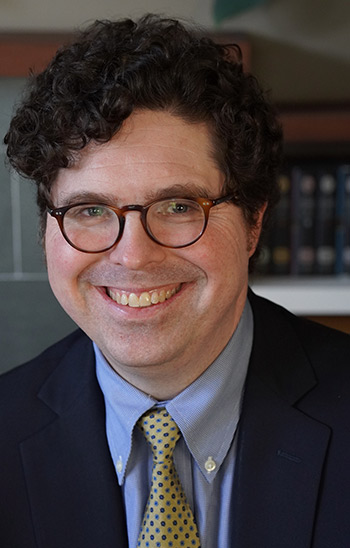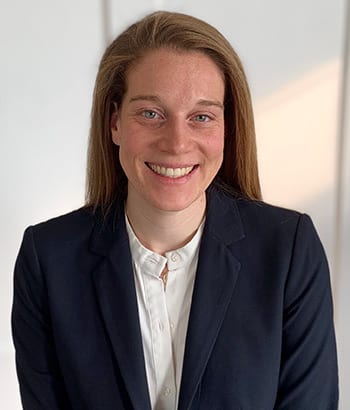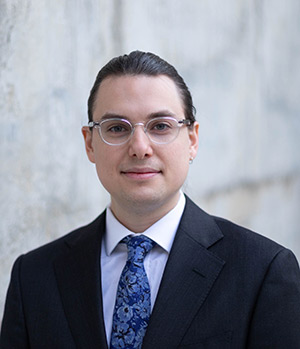By Andrew Cohen

If you win the most prestigious teaching award at the world’s top-ranked public university, many assume you’re blessed with an innate gift. But colleagues and students of Berkeley Law Professor Andrew Bradt, one of five faculty members recently given UC Berkeley’s annual Distinguished Teaching Award, see tireless preparation leading to frequent inspiration.
“It’s tempting to see Andrew in the classroom and think, ‘He’s a born teacher; it just comes naturally,’” says Professor Andrea Roth, who won the same award in 2019. “But the truth is, he prepares meticulously for each session, more than anyone I know. He just makes it look easy.”
The award recognizes teaching that incites intellectual curiosity in students, engages them thoroughly in the enterprise of learning, inspires departmental colleagues, and makes students aware of vital relationships between the academy and the world at large. You can see the award presentation here.
“The single best part of my profession is helping to equip our students to achieve their goals,” Bradt says. “They are incredibly talented, but also scrappy, ambitious, and game for a challenge. Working with them — and nudging them to be their best — is a privilege. I’m lucky to teach many of them in Civil Procedure during their first semester, and then I often get to see them in another class as they near the end of their time here. It’s a wonder to see them develop as budding attorneys.”
Bradt and the other four award winners receive a cash prize from the campus and recognition by the Academic Senate, and will serve on university forums, panels, and committees involving teaching issues.
“It’s incredibly humbling, especially because of the Berkeley Law legends who have won this award, like Bob Berring, Herma Hill Kay, Eleanor Swift, and Willy Fletcher, not to mention my current colleague, Andrea Roth,” says Bradt, who also won Berkeley Law’s 2019 Rutter Award for Teaching Distinction.
“I’ve learned from the very best. Teaching is really the core of our mission at Berkeley Law, so it’s an honor to have the opportunity to represent our faculty and our collective dedication to our students. I am so grateful to Associate Dean Molly Van Houweling, Assistant Dean Susan Whitman, and Dean Erwin Chemerinsky for nominating me for this award. Without their support and hard work, this would never have happened.”
Cultivating connection
A scholar and teacher of civil procedure, conflict of laws, remedies, and federal multidistrict litigation, Bradt is a Harvard Law graduate who also taught there as a fellow and lecturer. He also worked as a litigator at Jones Day in New York City and at Ropes & Gray in Boston before entering academia, and clerked for two federal judges.

Jordan Bock ’17 took Conflict of Laws with Bradt as a 2L, and he was an advisor on her student note the following year. A former judicial clerk for U.S. Supreme Court Justice Elena Kagan and now an associate at Goodwin Procter in Boston, Bock describes Bradt’s teaching, and mentorship, as hugely influential.
“There are so many reasons Professor Bradt is a phenomenal teacher, but what stands out to me most is the environment in his classroom,” she says. “More than anything else, I associate his class — and my interactions with him more generally — with joy. I could always tell that he loved law and loved teaching. His classes and his advice were always imbued with a belief that law was both a wonderful profession and a force for good in the world. That’s something that I have truly carried with me past graduation.”
The joy component is no accident. A firm believer that some levity makes students more receptive to new ideas, Bradt cites taking oneself too seriously as the only cardinal sin in his classroom.
In class, he regularly uses the Socratic Method — where professors call randomly on someone and prod critical thinking through an unrelenting series of questions.
“Andrew shows how the Socratic method need not be hostile and, instead, can be a means of empowering students,” Roth says. “He also, through his pro bono work and groundbreaking scholarship on multidistrict litigation, shows how the rule of law can be a powerful tool of reform.”
Room for debate
A prolific scholar frequently published in law journals and cited by courts and prominent legal treatises, Bradt is the co-author of leading textbooks on pleading and procedure as well as advanced civil procedure. With his students, he works to create a respectful environment that not only allows for but actively seeks different viewpoints.

“The law school classroom cannot be only a mutual-admiration society,” Bradt says. “The issues we work on are hard, and reasonable people of good faith can disagree. Through pushing them, they push themselves to see problems from all sides.”
3L Sean Kolkey has taken three courses with him and served as his research assistant the past two semesters. He says he regularly sees how Bradt is dedicated to his students’ needs, and to ensuring that they connect the week’s lessons with the greater themes of the course.
Earlier this semester, Bradt asked whether it was good for plaintiffs’ attorneys to seek disclosure of sensitive corporate information through discovery. The conversation evolved into a half hour of back-and-forth between teacher and students, and Bradt “was relishing every moment of it,” Kolkey says.
“After each week, he sends an email recapping the material and foreshadowing our next topics — a small gesture, but one that’s emblematic of his sincere investment in his students’ experience,” Kolkey adds. “Above all else, there is a genuineness to the way that Professor Bradt presents both himself and the material.
“In each interaction I’ve had with him, inside or outside the classroom, it truly feels like there’s nothing he’d rather be doing and nowhere else he’d rather be. In a world as multifaceted and demanding as legal academia, that is certainly no easy feat.”